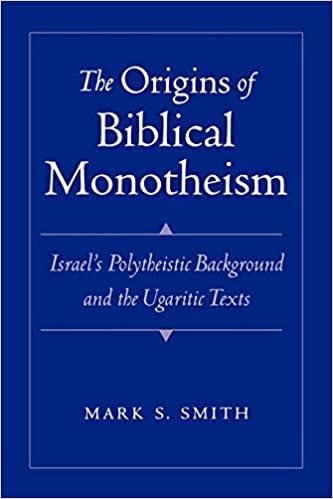File:2001 Smith.jpg
2001_Smith.jpg (333 × 499 pixels, file size: 21 KB, MIME type: image/jpeg)
The Origins of Biblical Monotheism: Israel's Polytheistic Background and the Ugaritic Texts (2001) is a book by Mark S. Smith.
Abstract
Rather than envisioning "polytheism" and "monotheism" as two antithetical religious ideologies, whereby the former ultimately became usurped by the later in more advanced societies through a contentious evolutionary process, Mark Smith employs these two terms merely as entry points in order to describe what it means for something to be divine. As such, he sees much more continuity between the polytheism expressed in Ugartic texts, in ancient Israelite texts, and even in the monotheistic expressions that emerge later in the Hebrew Bible, most notably in Isaiah 40-66. For instance, after a close analysis of Ugaritic texts, he suggests that within these texts the notion of the family household provided polytheism with the sort of "oneness" that monotheists associate with monotheism. Likewise, he shows how the divine assembly of ancient Israel was able to hold as one reality a monistic impulse in a pluralistic cosmic structure (50). Accordingly, he underscores how for both religious ideological systems, humanity and divinity fall in two generally incommensurate categories. Thus, to be divine is not to be human.
When monotheism did finally emerge in Judah during the late exilic and post-exilic period, this was not "a new stage of religion but a new stage of rhetoric in a situation never known prior to the threat of exile" (193). As Judah became increasingly exposed to the triumphant states of Babylon and Assyria, and as her own monarchy and power unraveled before her eyes, monotheism became a way for Israel to reinforce her exclusive relationship with her deity. Monotheism was a rhetoric, or a kind of inner community discourse, that established distance from outsiders and community within. As land became replaced by written prophecy, the "dominant voices preserved in the post-exilic period-- priestly, deuteronomic, wisdom, and apocalyptic-- all promoted the new vision of the one and only deity, the one to whom the religions of the Book have continued to turn for inspiration" (194). ~Deborah Forger
"As the bible tells us, ancient Israel's neighbours worshipped a wide variety of gods. It is now widely accepted that the Israelites' God, Yahweh, must have originated as one among these many, before assuming the role of the one true God of monotheism. Mark Smith here seeks to discover more precisely what was meant by "divinity" in the ancient near-East, and how these concepts apply to Yahweh. Part One of the book offers a detailed examination of the deities of ancient Ugarit, known to us from the largest surviving group of relevant extra-biblical texts. In Part Two, Smith looks closely at four classic problems associated with four Ugaritic deities, and considers how they affect our understanding of Yahweh. At the end of the book he returns to the question of Israelite monotheism, seeking to discover what religious issues it addressed and why it made sense at the time of its emergence. He argues that within the Bible, monotheism is not a separate "stage" of religion but rather represents a kind of rhetoric reinforcing Israel's exclusive relation with its deity."--Publisher description.
Editions and translations
Published in New York, NY: Oxford University Press, 2001.
Contents
Part. I. The structures of divinity.
- 1 - Anthropomorphic deities and divine monsters
- 2 - The divine council
- 3 - The divine family
- 4 - Pluralities, pairings, and other divine relations
Part. II. Characteristics of divinity.
- 5 -The traits of deities
- 6 - The life and death of Baal
Part. III. The origins of monotheism in the Bible.
- 7 - El, Yahweh, and the original God of IsraEL and the Exodus
- 8 - The emergence of monotheistic rhetoric in Ancient Judah
- 9 - The formation of monotheistic theologies in biblical literature
- 10 - Monotheism in Isaiah 40-55.
External links
- [ Google Books]
File history
Click on a date/time to view the file as it appeared at that time.
| Date/Time | Thumbnail | Dimensions | User | Comment | |
|---|---|---|---|---|---|
| current | 09:34, 28 November 2021 |  | 333 × 499 (21 KB) | Gabriele Boccaccini (talk | contribs) |
You cannot overwrite this file.
File usage
There are no pages that use this file.
